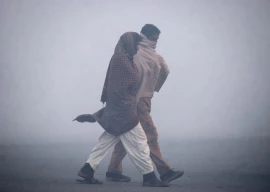
Colourful mango, banana and orange juices in two- and five-litre bottles, ranging between Rs50 and Rs100 in price, were selling briskly on Friday.
One stall sold them under a banner reading: “Asli and sasti Ramazan deals, low price for maximum quantity.” But the labels on the bottles do not mention expiry dates, and some do not even name the manufacturers. None identify the ingredients contained in the juices.
Hamid Muneer, an elderly shopper at the Ramazan Bazaar in Singhpura Mandi, Gulberg Town, said he was shocked at how many people were buying the drinks. He blamed the city government for allowing the sale.
Haji Billa, a shopper at Model Town Ramazan Bazaar, said that he had bought a five-litre bottle a couple of weeks before the start of Ramazan, but threw it away after his friend, a nutritionist, told him how unhealthy it was.
“I saw them again at stalls at the Ramazan Bazaar, which gave me the impression that the CDGL may have allowed the shopkeepers to sell them,” he said.
The district officer (food) later inspected the bazaars and fined shopkeepers. But earlier, the official in charge of the complaint centre said that he had not heard any complaints about the sale of spurious drinks from the public, from the 70 price control magistrates, the 63 Livestock Department official assigned to monitor Ramazan Bazaars, the nine food inspectors led by the DO (food) nor the district coordination officer supervising the Ramazan Plan 2010.
Saleha Saeed, a price control magistrate in Gulberg Town, said she was not authorised to stop the sale of counterfeit items. “My job is to simply monitor the prices,” she said, adding that it was the DO’s (food) job to remove unhygienic foods and drinks from the market.
A CDGL official in the Food Department said that spurious soft drinks flooded both the wholesale and retail markets. He said the Food Department had launched a “massive drive” to check the sale of unhygienic drinks one month before Ramazan. “We seized more than 800 five-litre bottles and issued challans to shopkeepers. We have also started a special Ramazan campaign to clamp down on the sales in Ramazan Bazaars,” he added.
He said that units manufacturing adulterated and spurious juices were operating in the Bund Road, Bhaseen, Manawan, Chuhng, North Lahore and Kahna areas.
DO (Food) Dr Masood Ashraf said that he had visited Ramazan Bazaars in Singhpura, Wahdat Road, Shadman, Dehli Gate and Shadbagh to monitor hygiene and the condition of packed and unpacked items.
Under his orders, Food Inspector Kamran Butt seized 62 five-litre bottles of spurious drinks at the Wahdat Road bazaar, and food inspector Ahsan Bin Aqeel confiscated 75 bottles in the Singhpura Ramazan Bazaar.
He said that challans had been issued to shopkeepers and samples of the drinks sent to CDGL laboratories.
He said that the Pure Food Rules 2007 law outlawed the manufacture and sale of spurious drinks. He said the laws relating to food standards in the Punjab dated back to rules introduced by the colonial rulers in 1860 and updated in 1929. He said the rules were incorporated without much change in Pakistan through the West Pakistan Pure Food Rules 1965. Violation of the rules is punishable with 5-15 years of imprisonment and fines ranging from Rs500,000 to Rs2.5 million.
He said that new rules made it compulsory for all food manufacturers to print the manufacturing and expiry dates on their products. The rules empowered food inspectors to ensure that every eatery owner abides by basic hygiene requirements, prepares food in a covered and clean area, meets standards in the ingredients used.
Ali Hussain, a general physician, said food colours found in adulterated and spurious soft drinks, juices and bottled water could cause hepatitis, stomach diseases and typhoid, especially in children.
Published in The Express Tribune, August 14th, 2010.

1726117332-0/Megan-Thee-Stallion-(1)1726117332-0-165x106.webp)





















COMMENTS (5)
Comments are moderated and generally will be posted if they are on-topic and not abusive.
For more information, please see our Comments FAQ